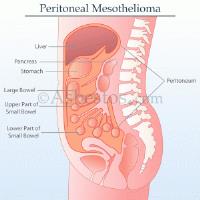 Add My Company
Add My Company
Sign In

At one time, asbestos was used throughout the UK in construction, as it was an excellent building material thanks to its sound and heat insulation properties. However, nowadays we know that it causes many different diseases, the most common of which is mesothelioma.
There are six different types of asbestos disease:
Asbestosis
Pleural mesothelioma
Peritoneal mesothelioma
Testicular mesothelioma
Pericardial mesothelioma
Lung cancer
(Image courtesy of OnlineMesothelioma.com)
What is peritoneal mesothelioma?
Peritoneal mesothelioma is caused by asbestos and is the second most common type of asbestos disease. When loose asbestos fibres are inhaled over a long period of time, they can become lodged within the body and cause tumours to develop.
This kind of asbestos mesothelioma attacks the lining of the abdomen, which is known as the peritoneum. There are actually two types of peritoneal mesothelioma – ‘wet’ and ‘dry’.
If there are lots of masses or one large mass in the peritoneum but no ascites (fluid buildup in the abdomen), it is ‘dry’ peritoneal mesothelioma.
If there are numerous cancerous nodules and no ascites, it is ‘wet’ peritoneal mesothelioma.
Who can be diagnosed with peritoneal mesothelioma?
Both men and women can be diagnosed with peritoneal mesothelioma, and those between the ages of 30 and 70 are most commonly diagnosed with it.
What are the symptoms of peritoneal mesothelioma?
Peritoneal mesothelioma has similar symptoms to many other diseases, which can sometimes lead it to be misdiagnosed. There are a lot of different symptoms to look out for though.
The main peritoneal mesothelioma symptoms include:
Unexplained weight loss
Abdominal pain
Ascites (abdominal fluid retention)
Bowel obstructions
Anemia
Fever and night sweats
Swelling of the neck and face
How is peritoneal mesothelioma diagnosed?
Despite the fact that peritoneal mesothelioma is the second most common asbestos disease, it is very hard to diagnose. It can take a long time for an official diagnosis to come through because so many tests need to be carried out.
The following tests may be carried out in order to diagnose it:
CT scans
MRI scans
Biopsies
How is peritoneal mesothelioma treated?
There are quite a few treatments for peritoneal mesothelioma, with surgery being one of the most favourable options. If the cancer is caught early enough though, patients can see a higher level of success when the full tumour is removed. Unfortunately, this is not always possible if the cancer is in the later stages.
The available treatments for peritoneal mesothelioma include:
Surgery (peritonectomy, cytoreductive surgery, paracentesis, etc.)
Chemotherapy
What is the prognosis for peritoneal mesothelioma patients?
More and more patients are being diagnosed in the early stages of peritoneal mesothelioma, which means that they can be offered a better prognosis and life expectancy. However, it is still a rare disease and more research needs to be carried out into it.
Life expectancy for patients that are treated early on is usually around one year, although some survive past two years.
The content of this site is intended to inform, not to diagnose. If you believe that you may have symptoms similar to those experienced by peritoneal mesothelioma patients, Northern Insulation Contractors advises you to visit your GP immediately.
For more information on Asbestos Diseases: Peritoneal Mesothelioma talk to Northern Insulation Contractors
Enquire Now
More related to Asbestos Diseases: Peritoneal Mesothelioma
List your company on FindTheNeedle.
